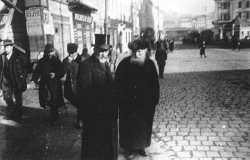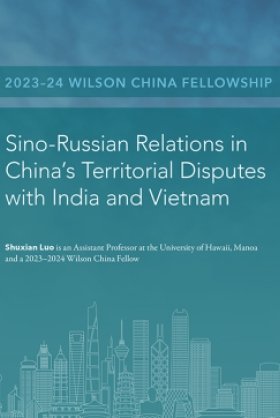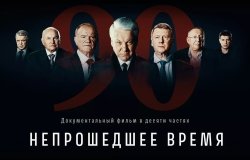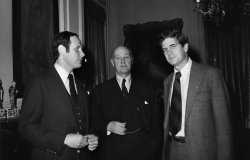157. Reflections on The "Elegant Takeover" of Czechoslovakia
With the end of the Cold War, we have been given the opportunity not only to research in archives hitherto inaccessible but also to rethink aspects of East European history freed from the ideological preconceptions carried in that struggle. In this regard, and particularly in light of Eastern Europe's search for a usable past, the question of the postwar slide into communist dictatorship seems ripe for rethinking. The fact is that there were significant elements in each society of the region that were in favor of the communist "solution" to the problems of postwar reorganization and reconstruction, and many more amenable to that solution.
Aspects of my research explore the debates on the meaning of the Czech nation and the meaning of socialism that took place among a large number of Czech creative and scholarly intellectuals, journalists, social critics, and politicians between 1945 and 1948. The views of this group ranged from the permitted political right (in the Roman Catholic People's Party) to the Communist Party on the left, but I focus on public figures allied with two political forces. The first of these I label "democratic socialism," which was centered in the National Socialist Party and aimed to build a socialist, yet still democratic and Western Czechoslovakia. It had as its leaders Eduard Benes, Ferdinand Peroutka, and Václav Cerný, men from whom our Cold War understanding of the communist takeover was drawn. The second is, of course, communism, as represented by men ranging from Klement Gottwald, through Gustav Bares, to E.F. Burian. In examining the debates, I investigated how the Communist Party achieved its stunning popularity (winning 40 percent of the Czech vote in the free 1946 elections), what the message of the so-called "brave democrats" in the period before the takeover had been, and why the communist assumption of power in Czechoslovakia had been so easy compared to those of neighboring states.
What I found surprised me. Far from raising a strong and vibrant intellectual defense of their Westernism, relative political and economic moderation, and Czech traditions, Czech democratic socialist intellectuals contributed to the communist intellectuals' goal of creating a Czech self conception that was expressly socialist and culturally oriented toward the Slavic East. Communist intellectuals gained support from their opponents for their reinterpretation of Jan Hus (proto-socialist), the interwar First Republic (politically flawed and socially unjust), Tomás Masaryk (enlisted in the cause of socialism), and for their interpretations of the politically sensitive issues of the experiences of Munich (betrayal by the explicitly capitalist West) and the war (won by the great USSR as a result of its superior social organization and moral strength). The result of these and many other debates was that democratic socialist public leaders co presided over the largest swing in self-conception the Czech nation had ever experienced.
The political effect of this cultural reorientation is hard to measure, and begs one to question the meaning of socialism for the various political groupings, a topic with clear political ramifications. Here I found that democratic socialist intellectuals let their enthusiasm for socialism intrude upon their commitment to democracy, again-as in matters of cultural self-understanding-not well serving their broader public. In short, democratic socialist intellectuals, despite their claims (incorporated into Western histories) to have defended Czechoslovakia bravely and consistently against the Communists planning from May 1945 to overthrow the state, extolled a vaguely defined, moral version of socialism whose content they never critically examined and the political implications of which they never carefully considered. When February 1948 came around, the price for this intellectual confusion and lack of clear direction came due, as hundreds of thousands protested for the communist solution to the government crisis, while only a few thousand openly opposed this solution. While democratic socialist intellectuals cannot be held responsible for the Communists' rise to total power, at least some measure of responsibility for the ease with which they did so can certainly be found in the failure of the Democratic Socialists to actively counter the Communists' reinterpretations of the nation and their failure to provide a clear alternative to communist notions of socialism, and ultimately even freedom and democracy.
----------------------------------------------------------------------------------------------------
H. Gordon Skilling comments:
Bradley Abrams' thesis examines the debate among the intellectuals as a major causal factor of the victory of the Communists in 1948. This is a welcome move away from the black and white analysis of the Cold War period that focused on the struggle of evil totalitarianism against the noble democrats and placed the blame for the communist victory on Moscow, the Communists, and the failure of Benes and the non-Communists. It is a richly documented analysis of the debate among four groups of intellectuals: the Communists, the Democratic Socialists, the Protestants, and the Catholics.
One question that arises concerns whether this was a genuine intellectual debate. On the one side were independent, free thinking intellectuals such as Peroutka and others who were sincere believers. On the other side were political leaders such as Benes and Gottwald, and political intellectuals such as Zdenek Nejedlý, Václav Kopecký, Ladislav Stoll, and others. The latter were Communist Party members, imposing or obeying discipline and shifting their views according to changing Party policy and shifting Soviet interpretations.
The National Socialists are taken by Abrams to represent the democratic socialist camp. This omits the Social Democrats, one wing of which supported the communist viewpoint, the other opposed it. Moreover, the Communist Party had always been dual in character, divided between the Bolsheviks and the Democratic Socialists, and one wonders if they were united in this debate.
It would be interesting to see more on whether the debate was decisive, or even relevant, to the victory of the Communists. Was the communist victory due rather to the Party's political strategy and ruthless manipulation of events in these years and in February 1948; and did the intellectual debate afford the Communists some marginal support in this struggle? An examination of the course of events in other countries, such as Poland and Hungary, might throw light on the relevance of the intellectual debate as compared to political strategy in the attainment of communist power.
Another point to raise is whether Pan-Slavism was a real factor in the debate. The Soviet Union was not a Slavic country, and the people's democracies included non-Slavic countries. Stalin and Nejedlý used the Slavic theme as a propaganda device to support their power political aims and dropped it after 1948. Benes' espousal of Slavism was not in accord with the main tendencies of Czech history in which Pan-Slavism had played a marginal role.
H. Gordon Skilling and Bradley Abrams spoke at an EES Habsburg seminar on March 19, 1998.
About the Author
Bradley F. Abrams
Read More
Global Europe Program
The Global Europe Program is focused on Europe’s capabilities, and how it engages on critical global issues. We investigate European approaches to critical global issues. We examine Europe’s relations with Russia and Eurasia, China and the Indo-Pacific, the Middle East and Africa. Our initiatives include “Ukraine in Europe” – an examination of what it will take to make Ukraine’s European future a reality. But we also examine the role of NATO, the European Union and the OSCE, Europe’s energy security, transatlantic trade disputes, and challenges to democracy. The Global Europe Program’s staff, scholars-in-residence, and Global Fellows participate in seminars, policy study groups, and international conferences to provide analytical recommendations to policy makers and the media. Read more











